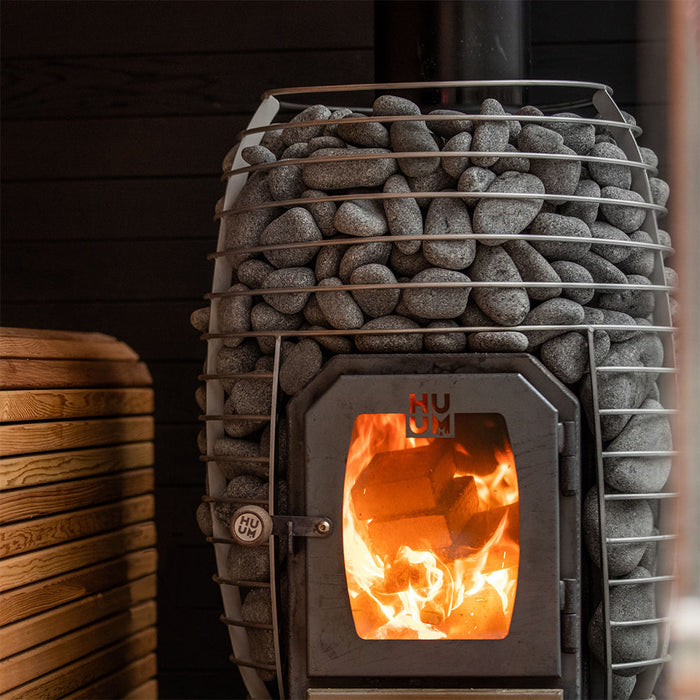Choosing between electric sauna heaters and wood-burning sauna stoves can be a challenging decision. Both types have their unique advantages and drawbacks, and the right choice largely depends on your specific needs and preferences. This comprehensive guide will compare the two types of sauna heaters, examining their features, benefits, and potential downsides to help you make an informed decision for the heart of your sauna.
Overview of Electric Sauna Heaters
Electric sauna heaters are popular for their convenience, fast heat up times, ease of use, and consistent performance. They are ideal for both residential and commercial saunas and offer a range of features to enhance your sauna experience.

Features:
-
Ease of Use: With a simple push or twist of a button, electric heaters can reach the desired temperature quickly.
-
Temperature Control: Precise control over the temperature, usually via a digital or manual thermostat.
- Temperature Range: Most electric heaters can get your sauna up to 195 degrees Fahrenheit. Some brands such as HUUM can get your sauna up to 230F for those who enjoy a very hot experience.
-
WiFi Controls: Many modern electric heaters come with WiFi capabilities, allowing you to control your sauna remotely through a smartphone app.
-
220V Connection: Typically requires a 220V hardwired electrical connection, ensuring a reliable power supply.
-
Low Maintenance: Minimal maintenance is required compared to wood-burning stoves.
-
Safety: Built-in safety features such as automatic shut-off and overheat protection.
-
Installation: Easy to install and can be wall-mounted or floor-standing.
Benefits of Electric Sauna Heaters:
-
Convenience: One of the main advantages is the ease of operation. You can pre-set the temperature and timer to have the sauna ready when you are.
-
Consistency: Electric heaters provide consistent and even heating, ensuring a comfortable sauna experience every time.
-
Cleanliness: No need to deal with wood, ash, or smoke, making it a cleaner option.
-
Quiet Operation: Electric heaters operate quietly, allowing for a more relaxing sauna environment.
-
Advanced Controls: WiFi controls add a layer of convenience, allowing you to start heating your sauna from anywhere.
Overview of Wood-Burning Sauna Stoves
Wood-burning sauna stoves offer a traditional sauna experience that many enthusiasts appreciate. They create a unique ambiance with the sound and smell of burning wood, adding to the overall sauna atmosphere.

Features:
-
Traditional Experience: Provides an authentic and rustic sauna experience.
-
High Heat Output: Capable of reaching very high temperatures, making them suitable for larger saunas.
-
Ambiance: The crackling fire and the scent of wood enhance the sauna experience.
-
Off-Grid: Ideal for remote locations without access to electricity.
-
Permits: Installation may require permits depending on local building codes and regulations.
Benefits of Wood-Burning Sauna Stoves:
-
Authenticity: The traditional wood-burning sauna experience is unmatched in terms of ambiance and atmosphere.
-
High Heat: Wood stoves can generate higher temperatures, ideal for those who prefer a more intense sauna session.
-
Independence: Perfect for off-grid locations or areas with unreliable electricity.
-
Economical: Wood can be a cost-effective fuel source, especially in rural areas.
Comparing Electric and Wood-Burning Sauna Heaters
Installation
Operation and Maintenance
Heating Time and Efficiency
Cost Considerations
Deciding Which Sauna Heater is Right for You
Choosing between an electric sauna heater and a wood-burning sauna stove depends on several factors:
-
Location: If you have access to reliable electricity and prefer convenience, an electric heater is ideal. For off-grid locations, a wood-burning stove is the better choice.
-
Sauna Experience: For a traditional, authentic sauna experience, nothing beats the ambiance of a wood-burning stove. If you prefer quick, clean, and consistent heating, go for an electric heater.
-
Installation and Maintenance: Electric heaters are easier to install and require less maintenance. Wood stoves need more hands-on management and regular upkeep.
-
Budget: Consider both the initial and ongoing costs. Electric heaters might have a higher upfront cost but lower maintenance costs. Wood stoves could be cheaper initially but require regular wood supply and maintenance.
-
Heating Preferences: If you like high, intense heat and don’t mind the effort of maintaining a fire, choose a wood-burning stove. For even, controllable heat, electric heaters are the way to go.
Conclusion
Both electric sauna heaters and wood-burning sauna stoves have their unique benefits. Your choice should be guided by your personal preferences, sauna location, and budget.
For the best deals and expert advice on sauna heaters, Havenly is your trusted source. We offer 24/7 support, free shipping across the US, and no sales tax on any orders. Plus, we guarantee the lowest prices on all our sauna heaters. Explore our range of electric sauna heaters and wood-burning sauna stoves to find the perfect match for your sauna.
Ready to enhance your sauna experience? Visit Havenly today!







Leave a comment